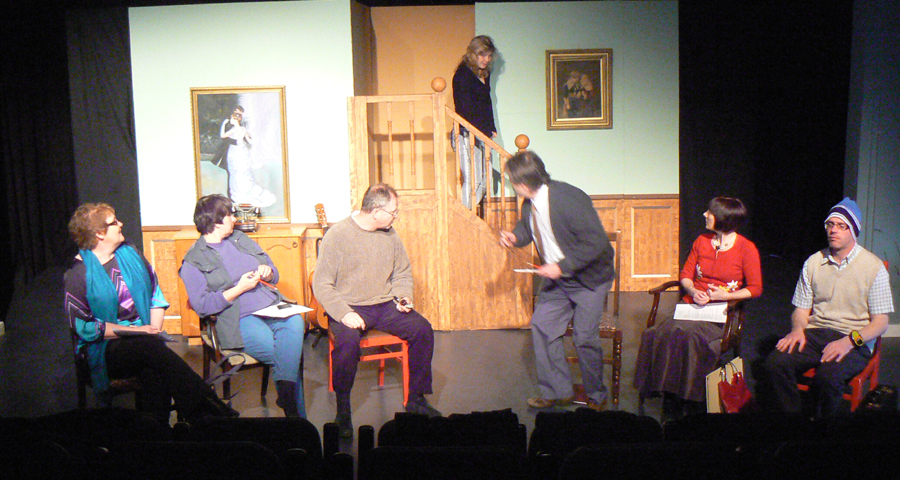Improbable
Fiction
by
Alan
Ayckbourn

Ayckbourn is our
most popular dramatist and this play shows why.
It starts as one of the comedy of modern manners that he does so well.
The first act shows a group of writers at one of their regular meetings.
Each of the writers has a particular specialty be it crime, historical romance,
science fiction, children’s stories or even musicals.
During the course of a rather shambolic meeting the chairman suggests that
they all cooperate on a single project;
an idea that the audience can see is doomed to failure.
After the meeting ends the evening changes.
The stories outlined earlier come to life around the hapless chairman.
He is in turn thrust into the various works as an unwitting participant.
Aykbourn writes
brilliantly in the style of each writers’ genre, be it set in Victorian
times, the 1930’s or the near future.
Arnold, the unwitting chairman, is caught in strange shifting stories that
are incredibly resolved by the end of the play.
He becomes more bemused as parts of an Agatha Christie story clash with one
from Wilkie Collins
and are both interspersed by a search for alien life forms from the town hall.
This is a great challenge for a cast of seven who play over twenty parts between
them in the course of a beautifully constructed show.
Review by Christine
Kennett
In more than ten
years of attending Wymondham Players productions I can honestly say that I
have never enjoyed one more than the sparkling performance of Alan Ayckbourn’s
“Improbable Fiction” that I watched on Friday night.
Despite the many changes of scene and costume (the changes of costume for
each actor alone must have taken a great deal of organisation and hard work)
the production was absolutely seamless and the pace never faltered. David
Atkinson, as Director and Producer, earned hearty congratulations.
The play is set in the sitting-room of Arnold, who organises a writers’
group.
His character, played by Pete Harrold, is constant throughout, the thread
that ties together the rest of the characters.
He played Arnold, who is bumbling and ineffectual, but “very nice”,
with a satisfying stability.
The play is in two acts, and in the first we are present at the writers’
group meeting, and meet five of them.
We learn that they are all aspiring writers in vastly different genres, and,
for one reason or another,
fail to succeed with their writing, apart from Arnold, who has the dubious
success of writing instruction pamphlets.
We first meet Jess, a farmer, who is trying to write historical romance, but
never gets further than research.
Tabi Paternoster gave a commanding performance as Jess, whose surface cynicism
thinly masks the sensitivity beneath,
and whose commentary as a governess provides unification for a series of scenes
in Act Two.
Grace is a housewife, who is trying to write a children’s story, “Doblin
the Goblin”,
but whose work never gets off the drawing-board – literally. Alison
Burton played this part with much elegance.
Amanda Oelrichs played Vivvi, a journalist, who writes crime fiction, and
also Fiona, a police sergeant,
in the second act, very adeptly bringing out the humour in the characters
and giving the audience much entertainment.
Vivvi has actually written six novels, but not had anything published.
The taciturn Clem, who writes science-fiction (or “science-fact”,
as he ominously refers to it as), was played by Paul Goldsmith,
who demonstrated his acting range with other parts in the second act, all
completely different and all very funny.
The last writer to arrive is Brevis, who does musical adaptations, but who
has lost his lyricist, so the last song he has been writing tails off unfinished.
Alan Carpenter’s performance as Brevis was very powerful; he took the
part of the doctor in Act Two with contrasting smoothness.
The only other character in the play, who is not a writer but a young girl
who looks after Arnold’s bedridden mother,
was played by Rachael Carpenter, with great charm; she managed to instil a
great deal of emotional range into this and the allied parts on Act Two.
This first act is set in the real world; at the end of it, with a great clap
of thunder
(well done the special effects and sound people, by the way, some most impressive
work!) and a scream,
we are transported into Arnold’s nightmare one, in which elements of
the characters and settings from the work discussed
at the meeting are woven together into a series of weird, but very amusing
scenes.
Part of the amusement of watching the second act is seeing how things from
the first act are transposed and appear in the second,
for example, how Clem’s malapropisms, which drove Brevis into such demented
rage, are transferred to his Space Police character in the second.
Also to be enjoyed in the second act for the literati in the audience, is
the finding of possible literary references – in the first act, P.D.James
is mentioned,
is the character of the police inspector who is always quoting poetry in the
second act, poking gentle fun at Adam Dalgleish?
Does Doblin the Goblin have echoes of Enid Blyton? Is the name “Brevis”
itself a literary reference?
A most interesting play, both in content and form - it provokes further thought!
All in all, this was an extremely successful production, which it deserved
to be,
since it was obvious that a great deal of time and hard work had gone into
it, both from those on stage and those behind the scenes.
It is nice to think that there are so many who are prepared to give their
time and energy to such a production,
purely for the love of the dramatic art. In the Wymondham Players, the town
of Wymondham has a theatre group to be proud of.